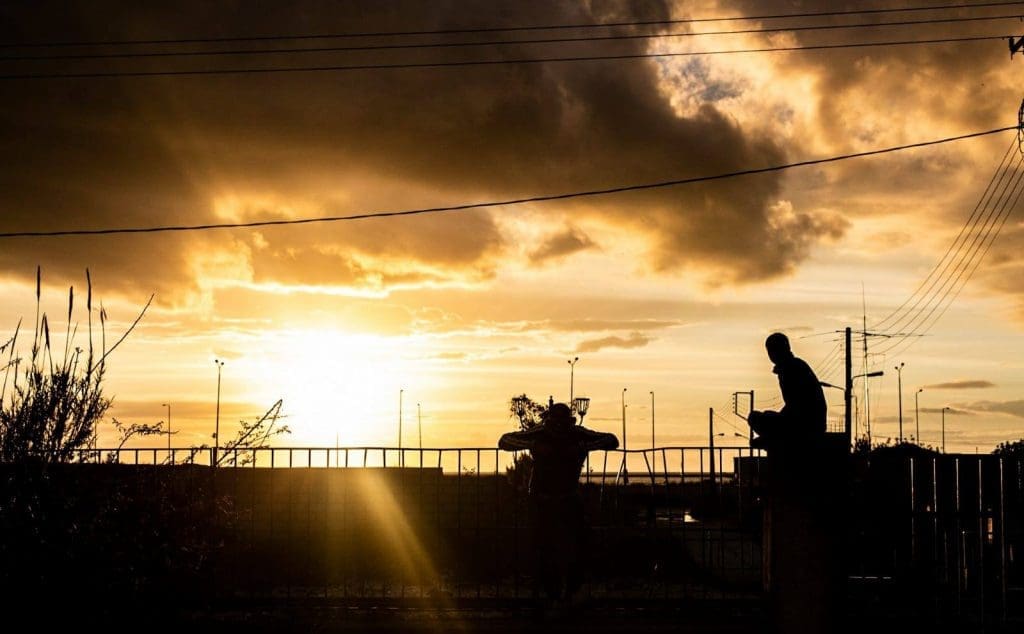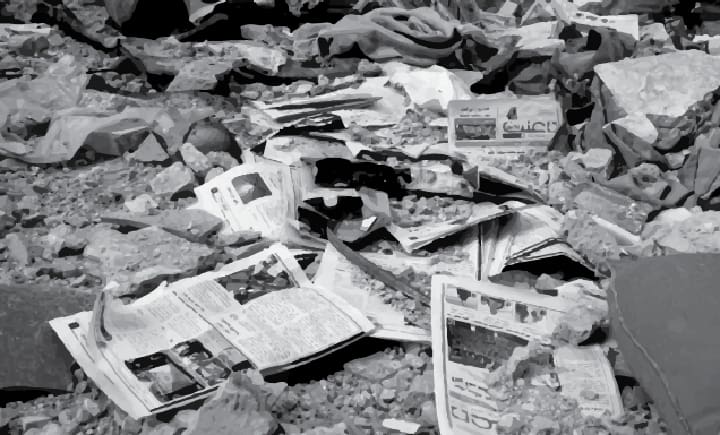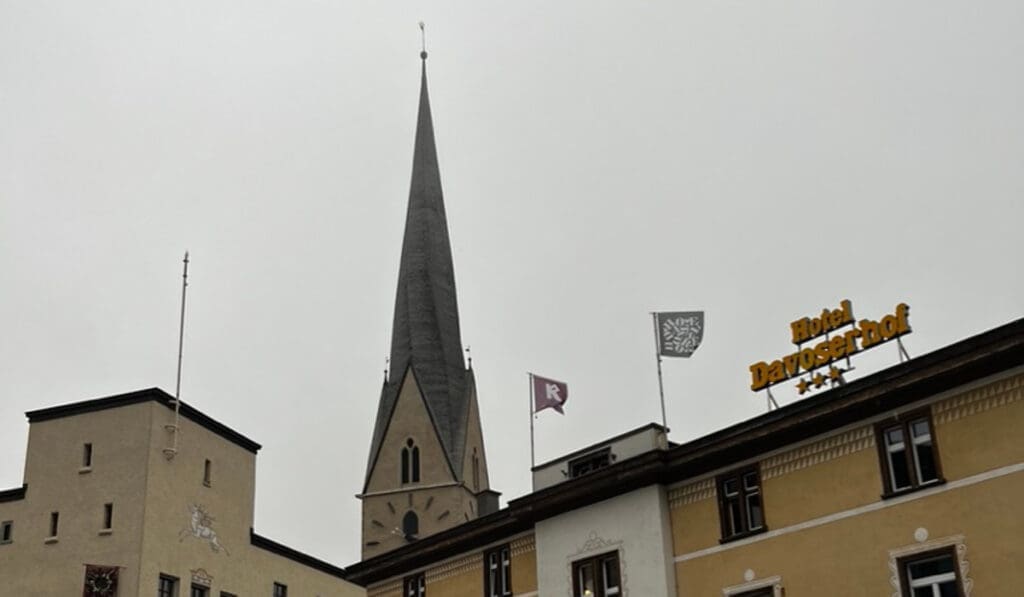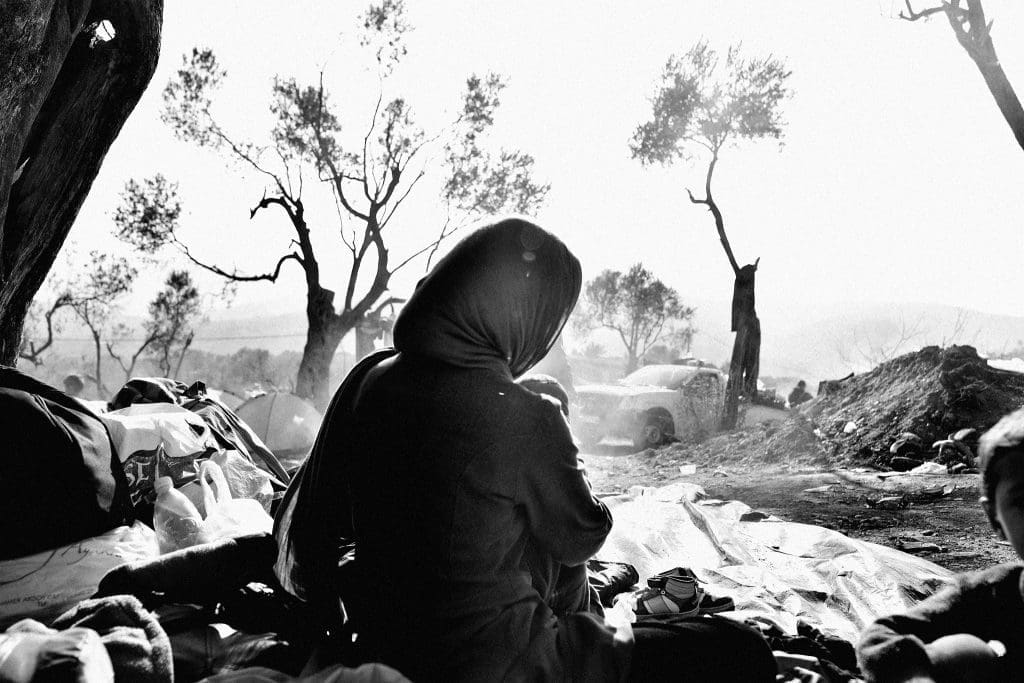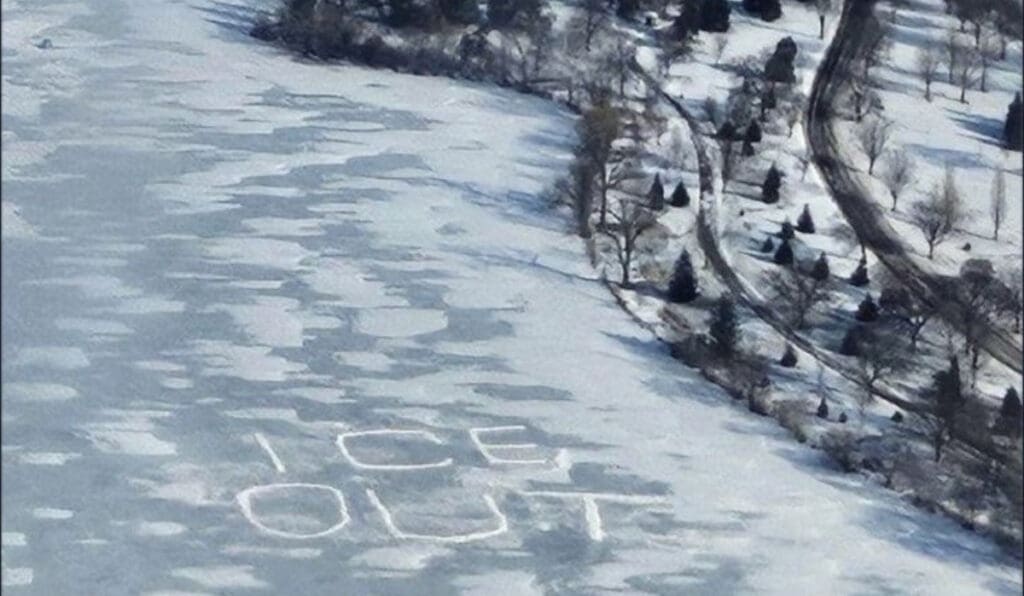AntiNote: It has been too long since our attention has turned to the situation on the Bosnian-Croatian border, which has continued to worsen in recent months. Meanwhile there has, as ever, been much independent reporting happening: the testimonies of refugees, aid workers, researchers, witnesses, and even disgusted border guards have been flowing continually, seeking the fickle graces of public scrutiny. These voices are challenged not only with the competition of other accelerating atrocities occurring on the expansive border apparatus enclosing the entire “Western” world, from other states of the EU to the US and Canada to Australia, but also with active suppression by government and corporate media elites on both sides of the border. Listening is an act of defiance, and of solidarity.
What follows are three significant outbursts of indignation and information. One from researchers and activists in Bosnia written in June, one from anonymous Croatian border cops written in March, and one from a solidarity and monitoring crew in Croatia written all the way back in January, warning about what they saw coming down the pike—and they were not wrong.
Please follow the linked sources for more information and ways to support people on the move and their accomplices fighting for life and justice in the Balkans. Abolish the camps and open the borders! Safe passage for all!
For a week now in Vučjak…
by Border Violence Monitoring
23 June 2019 (original post)
For a week now, local authorities have continued the transfer of people on the move staying in Bihać, Bosnia-Herzegovina, to the new jungle-camp located in Vučjak.
For a week now, people are removed from the town, while walking in the street or sleeping in their beds, by police patrols around the city.
For a week now, groups are spared if they don’t walk together, making them even more vulnerable.
For a week now, people staying in town are afraid to walk in the street, afraid of being taken by the police, afraid of being mistreated, afraid of being beaten.
For a week now, this fear has been palpable; a collective feeling, just like the fatigue, just like the distress, just like the pain.
For a week now, people are left in the middle of nowhere; among wilderness, among snakes, among mines.
For a week now, people feel that they are treated as animals, as if they were no longer considered as human beings, but rather a pest which needs to be controlled.
This “camp,” if we can call it so, has not improved in its short existence. Two water tanks have been added. A power generator has been on service a few hours a day, allowing the people forced to inhabit this place the chance to charge their phones for twenty minutes each. Several hours of lighting are provided at night. Who can call this a success?
For a week now, medical care has been limited, if not absent, on a daily basis.
For a week now, people lack access to toilets and showers.
For a week now, people have suffered from skin diseases linked to the lack of hygiene and the living conditions.
For a week now, people have food provided twice a day; their meals consist of a yogurt, two pieces of bread, two pieces of butter, and a can of fish or vegetables.
For a week now, people do not don’t know what will happen to them, since there is limited information provided, no registration for anything.
Last week authorities from the Una-Sana Canton in Bosnia-Herzegovina opened a camp to transfer the people on the move living outside of the over-capacity camp facilities in Bihać. They moved them to a field eight kilometers away which lacks any of the basic infrastructure needed to ensure the well-being of vulnerable people. For eight days, law-enforcement teams have patrolled the city, hunting people on the move to bring them to this place. On the first day, 282 people were transferred to this field where, at the time, only four tents had been raised and three water tanks were in place to provide drinking water. The people who were brought there did not receive food, nor medical care, despite many of them being injured by police during the raids earlier in the day. The next day food was provided once and then, in the following days, twice, in limited quantity. Who can call this progress?
The Red Cross is the only organization currently providing services, with limited abilities.*
This treatment is degrading towards people on the move and moreover, the use of force by the authorities to relocate people to this place has been disproportionate.
We would like to include an important point made by Stefan Von Ortenburg:
With respect to your sentence “The Red Cross is the only organization currently providing services, with limited abilities,” one has to add that the Red Cross was the only organization who supported the move of the people to this hostile environment.
It’s hard to understand why the Red Cross supported the erection of the Vučjak camp. Independence from government and authorities is one of the main principles of the Red Cross worldwide.
The Red Cross should have enough expertise to judge for themselves that this location is unsuitable. At least after hearing the arguments of the UN and EU, who desperately wanted to prevent the fatal decision, the Red Cross should have refrained from providing services that enabled the move.
Without the engagement of the Red Cross the whole Vučjak project probably would not have happened. People would either have stayed where they were, where they have been supplying themselves on their own, or sometime later people would have moved to a suitable accommodation center that could have been built using the thirteen million euros promised by the EU for this purpose. This reasonable solution however is out of sight, now that the EU has withdrawn the funds amid the controversy around Vučjak.
By playing an active role while enabling the camp in Vučjak, the Red Cross becomes guilty. They are just functioning as a subordinate service provider for the authorities, not as a humanitarian NGO.

Letter from Anonymous Croatian Border Police to Ombudswoman Lora Vidović
by disaffected police officers of station _____, translated by Petra Matić
17 July 2019 (original post)
This letter was received by Vidović in March 2019. For more information, check out this article on the Croatian site H-Alter. The ombudswoman decided to publicize the letter after months of stonewalling and inaction by other officials.
Dear Ms.,
We are asking for your help because we see that you are the only one taking care of the illegal practices towards refugees and distressed people, who we treat in a bad and inhumane way every day.
I am a worker of the police station _____ and I have been working on protection of the national border for a long while. A few of us are screaming, we have no more will nor power to look at what is being done to these humans.
Every day we return them to Bosnia, without papers, without processing; no matter whether they are women, children, we treat everyone the same.
There is no asylum; that doesn’t exist, only in extraordinary situations, with media attention.
Orders of the chief, the executive, and the administration is to return everyone without papers, no visible marks, take money, break mobile phones or take them, and forcefully return refugees to Bosnia.
This is the truth about how we treat them. The police that come as extra resource units from the other police stations are especially cruel, because they are angry for being here, and they stay here only briefly so they do what they want without control. They remind me of the Janissaries, beating and stealing. This is sad, but true, and happens with the blessings of the executives from the police station and administration.
We few policemen are especially saddened by the fact that we are encouraged and ordered to do this by the executives, who should be working legally against these kind of practices and not allowing such behavior in the police.
Every day we return between twenty and fifty people. When they are driven here from other police stations, the people are exhausted, sometimes beaten up, and then it’s us who drive them during the night and forcefully push them back to Bosnia.
All sorts of stuff happens here; some police draw weapons—this is shameful for the police, and not what I imagined when I went to school.
I have personally returned around one thousand people during the night. I try to be as humane as possible, but if I refuse to do this I will lose my job, and how will I feed my family?
The group of us who share these views are asking you to stop this behavior and practice in the police.
All your public statements are correct, the media reporting is correct—and very mild compared to what happens in this police station.
It is very sad that executives in our station, and even those higher up in the police administration, mention your name in a very rude and inappropriate way. You do not deserve this, it is not suitable for highly educated people to receive such insults and name-calling.
You are only doing your job in a honorable and decent way, according to legal rules and regulations, and this is how police should work too, but unfortunately, we are far from that.
We ask you again to personally engage in stopping these bad practices that could lead to tragic consequences, and nobody wants that.
We believe in you, your fairness and legal work,
Disaffected police officers of police station ______

Letter to Citizens of the EU from the “Periphery”
The politics of closed borders are bringing us closer to fascist rule
by Are You Syrious? (Croatia)
4 January 2019 (original post)
We, the human rights defenders and citizens from the countries relegated to the “periphery” of the European Union (EU) and the Schengen space, want to express our deepest concern for the current situation in which we can see the rise of fascism and a deterioration in basic human rights, such as freedom of movement and the right to seek asylum.
The leniency towards and acceptance of the rise of the far right in European countries is worsening living conditions for people on the move and increasingly endangering their lives. The claim that the EU’s fundamental values are respect for human dignity and human rights, freedom, democracy, equality, and the rule of law has been in question for several years now. In 2018 this claim lost any remaining standing.
As human rights defenders and citizens, many of us coming from the recently war-torn former Yugoslav space, we are obliged to point out that current national governments at the periphery of the EU are supposed to act in accordance with guidance from Brussels. We do not want to justify the institutional inactions, violations, and violence used against people on the move in our countries, so we use all available legal and political means to fight their (in)actions. However, we also want to point out that it is the EU, the way it currently functions, that is justifying and making their actions possible.
We use the opportunity of the start of the new year to appeal to the citizens of all EU member states, as well as those from the countries that hope to become members one day, to return to the EU’s fundamental values and insist on and promote them in the realities of their own countries.
We call upon citizens of the EU to stand up and make their resistance stronger than the borders which the governments are building.
We call upon citizens of the EU to resist violence against people on the move, and to stand up against any officials, individuals, or groups who intend to continue with the diminishing of the basic rights that all people of the world are entitled to.
Today this violence is enacted upon people who dream about a better life in the EU; tomorrow it will be experienced by the citizens of EU member countries, their friends or relatives, based on some other traits that can be used as a basis for discrimination.
We want to warn, given our unpleasant privilege of the real lived experience of war, but also of the difficult post-war years, that it is exactly this kind of behavior which the bureaucracy of the EU is demonstrating now that enabled the dissolution of the Socialist Federative Republic of Yugoslavia and the consequent wars. In addition to this, it provided fertile ground for the exploitation of the traumatized and poor, the dehumanization of victims of war, and the rise of war profiteers in a similar way to what we see now. In the 1990s Balkans, people were often forced to rely on criminals who were promising to provide them with basic necessities, because governments and UN agencies often failed to do so — even such basic necessities as food, shelter, or safe passage from occupied territories.
Thus, we feel obliged to bring your attention to the urgent need to change the policies regarding the militarization and sealing of the borders in the EU. Now, when there is no legal way to enter the EU or to seek international protection at Europe’s borders, smugglers and profiteers are thriving again, while those who seek their basic rights are ignored, abused, or even criminalized.
With the upcoming EU parliamentary elections and the track record of national elections in member states in the last few years, we want to warn that we are again at the verge of the destruction of humanity. It is exactly these politics of closed borders and the encouragement of violence and disregard for human rights of a certain group of people that, within the framework of the representative democracy as we now have it, enable the rise and strengthening of fascism.
For these reasons, we call upon the citizens of EU countries to show political courage and solidarity with people on the move and demand that their governments live up to their obligations stemming from the respect for human dignity. The pressure has to come from your presence in the streets, advocacy engagements, petitioning, and acts you will make to change the EU as it is now.
The change will come with the solidarity and not charity you can show toward people who are dreaming about a better life in Europe.
For these reasons, we also call upon the governments in the EU member states to reconsider their current position of closed borders, and their paying of non member states to enforce border regimes which go against democratic principles. At the moment, by doing so, they are enabling the establishment of authoritarian regimes in the periphery of Europe and further, as well as giving more power within the EU to far-right politics by giving them legitimacy.
These policies give approval to violence against human beings at the EU’s borders. People are beaten up, tortured, sexually harassed, insulted, and humiliated. And according to well-documented independent reports and numerous testimonies from the field, this is all done by the repressive regimes, border guards, and police from EU member states.
If those who are currently making decisions in EU capitals do not reconsider their policies, they are going to be remembered in history as guilty of the fall of universal human rights, values, and human dignity.
We are entering 2019 with the scheduled EU parliamentary elections for May. There is a small window of opportunity to act and try to redirect the sinking ship. No one will make this change for us! No one will do it instead of you! As citizens of EU countries and those who aspire to become part of the EU, we all have to embrace our civil responsibility and ask for change where it matters—from our own governments and policy-making bodies in the European Union. When governments fail, citizens must act. Because Europe painfully remembers what fascism feels like. But it also knows the power of inclusion and solidarity.
Let’s remind our elected officials that solidarity, respect for human rights, freedom, and democracy is what is most urgent now. There are many ways to demand protection for those who suffer due to the disrespect of human rights. It can be direct action such as peaceful protest, targeted advocacy or any other form of civic pressure. But it must be constant, massive, and large enough to succeed. And that’s why every voice and every action matters.
European citizens must not remain silent, as they have so many times in the past.
Signatories:
Are You Syrious?
Nela Porobić Isaković, Sarajevo
Gorana Mlinarević, Sarajevo
Milena Zajović, Zagreb
Nidžara Ahmetašević, Sarajevo
Citizens:
Adis Imamović Piksi, Velika Kladuša
Adriana Zaharijević, Beograd
Aleksandar Pavlović, Beograd
Aleksandra Uzelac, Zagreb
Ana Čigon, Ljubljana
Antonija Petričušić, Zagreb
Andrea Grgić, Zagreb
Artan Sadiku, Skopje
Barbara Matejčić, Zagreb
Biljana Stanković Lori, Novi Sad
Bojana Ćulum, Rijeka
Bojana Videkanović, Sarajevo
Biljana Đorđević, Belgrade
Damir Arsenijević, Tuzla
Damir Imamović, Sarajevo
Danijela Dolenec, Zagreb
Dinko Gruhonjić, Novi Sad
Dobrica Veselinović, Beograd
Dražana Lepir, Banja Luka
Duško Vuković, Podgorica
Dženeta Agović, Tutin
Elma Tataragić, Sarajevo
Emina Buzinkić, Zagreb
Ervina Dabižinović, Herceg Novi
Faruk Šehić, Sarajevo
Gazela Pudar Draško, Belgrade
Goran Bubalo, Sarajevo
Helena Popović
Irena Cvetkovik, Skopje
Iskra Gešoska, Skopje
Iva Pleše, Zagreb
Ivan Blažević, Zagreb
Ivana Dragsić, Skopje
Ivan Đorđević, Beograd
Ivana Pantelić, Beograd
Ivana Ristić, Leskovac
Ivica Mladenović, Belgrade
Jasmina Vasileva, Skopje
Jelena Čolaković, Podgorica
Jelena Vasiljević, Belgrade
Jelena Vidojević, Belgrade
Jeton Neziraj, Prishtine
Jovan Džoli Ulićević, Podgorica
Maja Maksimović, Belgrade
Maja Raičević, Podgorica
Marijana Hamersak, Zagreb
Marijana Kučer, Split
Marina Škrabalo, Zagreb
Marjan Ivković, Beograd
Milan Vulović,
Milica Pralica, Banja Luka
Milivoj Bešlin, Novi Sad
Milovan Pissari, Beograd
Minja Bogavac, Beograd
Nataša Kršulj, Sarajevo
Nedim Sejdinović, Novi Sad
Nikola Vukobratović, Zagreb
Nuna Čengić, Sarajevo
Paola Petrić, Beograd
Paula Petričević, Kotor
Petra Matić, Zagreb
Roman Kuhar, Ljubljana
Rumena Bužarovska, Skopje
Sanela Lepirica, Ključ, Velačevo
Senad Pećanin, Sarajevo
Sanja Sarnavka, Zagreb
Snežana Baralić Bošnjak, Pančevo
Snežana Čongradin, Belgrade
Snježana Milivojević, Belgrade
Srećko Horvat, Zagreb
Suzana Kačić-Bartulović, Splita
Tea Hvala, Ljubljana
Zoe Gudović, Belgrade
Žarka Radoja, Belgrade
Groups and NGOs:
Autonomni kulturni centar Attack, Zagreb
Borders None, Zagreb
Centar za mirovne studije, Zagreb
Društvo za psihološku pomoć, Zagreb
Dugine obitelji, Zagreb
Inicijativa Dobrodošli
Inicijativa mladih Varaždin za Europsku prijestolnicu mladih 2022
Helsinški parlament građana, Banjaluka
K-zona, Zagreb
Legis, Skopje
Oštra nula, Banja Luka
Otvoreni Centar Bona Fide, Pljevlja
SOS Team Kladuša, Velika Kladuša
U dobroj vjeri, Zagreb
No Borders Community
Vox Feminae, Zagreb
Zaklada Solidarna, Zagreb

Featured image source: Diego Herrera via No Name Kitchen (Facebook)

